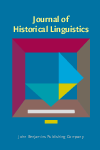
Journal of Historical Linguistics
Scope & Guideline
Connecting Scholars Through Language History
Introduction
Aims and Scopes
- Language Change Mechanisms:
The journal investigates the various mechanisms through which languages evolve, including phonetic, syntactic, and semantic changes, providing insights into how these processes differ across languages and time periods. - Diachronic and Synchronic Studies:
It features research that bridges diachronic (historical) and synchronic (contemporary) linguistics, allowing for a deeper understanding of language structures and their transformations over time. - Cross-Linguistic Comparisons:
The journal promotes cross-linguistic studies that highlight patterns and trends in language change, enabling researchers to draw connections between disparate linguistic families and their evolution. - Cognitive and Social Influences:
There is a focus on cognitive and social factors that influence language change, examining how these elements interact with linguistic structures and transformations. - Computational Approaches:
The incorporation of computational methods in the analysis of historical linguistics is a notable focus, facilitating more robust data analysis and the modeling of language change.
Trending and Emerging
- Semantic Change and Mapping:
There is a growing interest in the study of semantic change, particularly through the use of semantic maps. This approach allows researchers to visualize and understand the evolution of meanings across languages, contributing to a more nuanced understanding of language dynamics. - Alignment and Case Marking:
The examination of alignment systems and case marking is trending, with researchers investigating how these elements evolve over time and their implications for syntactic structures in various languages. - Impact of Language Contact:
Studies exploring the effects of language contact on linguistic change are increasingly prominent, reflecting an awareness of the sociolinguistic factors that drive language evolution in multilingual contexts. - Children's Role in Language Change:
Research focusing on the role of children as agents of language change is emerging, emphasizing the importance of language acquisition processes in understanding historical linguistics. - Computational Methods in Historical Linguistics:
The use of computational approaches to analyze language change is on the rise, enabling researchers to handle large datasets and conduct more sophisticated analyses of linguistic phenomena.
Declining or Waning
- Traditional Phonological Studies:
Research focused solely on traditional phonological changes has seen a decrease, likely due to the increasing integration of phonology with other linguistic dimensions such as syntax and semantics. - Narrow Language Family Studies:
There seems to be a waning interest in studies that focus exclusively on narrow language families without considering broader cross-linguistic implications, as the trend shifts toward more inclusive comparative analyses. - Historical Syntax in Isolation:
Although historical syntax remains a vital area, studies that approach it in isolation from other linguistic aspects are becoming less common, as interdisciplinary approaches gain more traction. - Descriptive Studies without Theoretical Frameworks:
There is a noticeable decline in purely descriptive studies that lack a theoretical framework, as researchers increasingly seek to contextualize their findings within broader linguistic theories.
Similar Journals
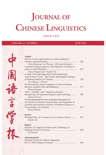
JOURNAL OF CHINESE LINGUISTICS
Cultivating Knowledge in the Realm of Chinese LinguisticsJOURNAL OF CHINESE LINGUISTICS, published by the JOURNAL CHINESE LINGUISTICS, is a prominent periodical that serves as a vital resource for researchers and scholars in the fields of linguistics and Chinese studies. With its ISSN 0091-3723, this journal has been contributing to the academic community since 1996 and continues to publish innovative research until 2024. Although it is classified in the third quartile (Q3) for both Arts and Humanities and Linguistics categories, its focus on Chinese linguistics positions it uniquely within this specialized domain. The journal is committed to advancing the understanding of Chinese language structures, usage, and context, encouraging interdisciplinary dialogue among linguists and language researchers. While currently not labeled as open access, the journal remains accessible to institutions and scholars worldwide, creating an invaluable platform for disseminating knowledge. As such, it plays a critical role in promoting linguistic diversity and cultural awareness within the academic landscape.

Lingue e Linguaggio
Fostering Insights in Linguistics and Language StudiesLingue e Linguaggio, published by SOC ED IL MULINO, is a distinguished academic journal in the field of Linguistics and Language, hailing from Bologna, Italy. With an esteemed Q2 ranking in its category as of 2023, this journal is recognized for its contributions to both the arts and humanities as well as social sciences, achieving notable positions within Scopus rankings. It serves as a vital platform for researchers, practitioners, and students interested in exploring various linguistic phenomena, language dynamics, and theoretical frameworks. Although it operates under a traditional subscription model rather than open access, its comprehensive array of studies and publications provides significant insights and fosters academic discourse. With a publication period extending from 2002 to 2024, Lingue e Linguaggio continues to be a key resource for advancing the understanding of language in contemporary contexts.

LINGUISTIQUE
Advancing Research in Language StudiesLINGUISTIQUE, an esteemed journal published by PRESSES UNIV FRANCE, serves as a vital platform for scholarly discourse in the fields of linguistics and language studies. With its ISSN 0075-966X and E-ISSN 2101-0234, this French journal has been a significant contributor to the understanding of linguistic phenomena since its inception in 2004, and it continues its journey through to 2024. Although currently categorized in the Q4 quartile for both Arts and Humanities (miscellaneous) and Linguistics and Language, its commitment to publishing quality research encourages a diverse range of articles, reviews, and innovative studies. Positioned in the 32nd and 29th percentiles for its respective fields according to Scopus rankings, LINGUISTIQUE is dedicated to advancing knowledge and stimulating engagement among researchers, professionals, and students alike. While it does not offer open access, the journal remains an essential resource for those who seek to deepen their understanding of linguistic principles in a global context, facilitating a richer discourse that connects theory with practice.
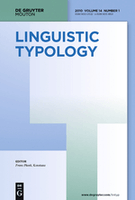
Linguistic Typology
Illuminating the Complexities of Linguistic DiversityLinguistic Typology is a premier journal focused on the comparative study of language structures and the classification of languages, published by Walter de Gruyter GmbH in Germany. Since its inception in 1997, the journal has established itself as a leading platform in the field of linguistics, achieving a remarkable Q1 category ranking in both Linguistics and Language for 2023, reflecting its impact and relevance among scholars. With a notable position in the academic community, evidenced by its 91st percentile rank in Arts and Humanities and 90th percentile in Social Sciences according to Scopus, Linguistic Typology invites contributions that explore the rich diversity of language structures, promoting a deeper understanding of linguistic phenomena across various cultures. While currently not offering open access, the journal remains a pivotal resource for researchers, professionals, and students aiming to advance their knowledge in the dynamic field of linguistics. For more information, deliverables, and submission guidelines, please visit the journal's official page.

Journal of Portuguese Linguistics
Illuminating the Nuances of Portuguese LinguisticsThe Journal of Portuguese Linguistics is an esteemed peer-reviewed academic journal published by UBIQUITY PRESS LTD, dedicated to the exploration of the rich complexities of the Portuguese language and its various linguistic dimensions. With an ISSN of 1645-4537 and an E-ISSN of 2397-5563, this open-access journal has been disseminating valuable research since 2002, ensuring that knowledge is accessible to all scholars, professionals, and students interested in Linguistics. Based in Portugal, it features a distinct focus on the linguistics pertinent to the Portuguese language, facilitating discussions that span theoretical and applied interests. The journal holds a respectable Q3 quartile rank in the field of Linguistics and Language, reflecting its growing significance and contribution to academia, as evidenced by Scopus rankings that place it in the 71st and 68th percentiles in Arts and Humanities as well as Social Sciences. Researchers and practitioners alike will find Journal of Portuguese Linguistics to be an indispensable resource for fostering discourse and innovation in the study of language.
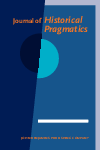
Journal of Historical Pragmatics
Fostering Dialogue Between History and PragmaticsJournal of Historical Pragmatics, published by JOHN BENJAMINS PUBLISHING CO, stands as a pivotal platform in the field of linguistics, focusing on the intersection of language, history, and pragmatics. With its ISSN 1566-5852 and E-ISSN 1569-9854, this esteemed journal has been curating scholarly discussions since 2000, with a converged publication timeline extending to 2024. Acknowledged for its academic rigor, it holds a commendable Q2 category ranking in the Linguistics and Language domain and features impressive Scopus rankings, being placed at #202 out of 1088 in Arts and Humanities and at #237 out of 1167 in Social Sciences. The journal is instrumental in advancing our understanding of historical language use and its sociocultural ramifications, offering researchers, professionals, and students a rich repository of articles that contribute to both theoretical and practical applications in historical linguistics and pragmatics. By fostering interdisciplinary dialogue and promoting innovative methodologies, Journal of Historical Pragmatics not only enriches scholarly literature but also strengthens the global academic community in uncovering the complexities of language through time.
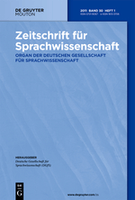
Zeitschrift fur Sprachwissenschaft
Innovating discourse in linguistics since 1982.Zeitschrift für Sprachwissenschaft, published by DE GRUYTER MOUTON, is a leading journal in the field of linguistics that has been contributing to scholarly discourse since its inception in 1982. With an ISSN of 0721-9067 and an E-ISSN of 1613-3706, the journal offers an Open Access model since 2017, ensuring widespread dissemination of research findings. Positioned in Q2 of the Linguistics and Language category for 2023, it ranks #312 out of 1088 in the Arts and Humanities and #370 out of 1167 in Social Sciences, reflecting its robust impact and contribution to the field. This German-based journal covers a diverse range of topics related to language and linguistics, appealing to researchers, professionals, and students alike. By fostering interdisciplinary dialogue and showcasing innovative research, Zeitschrift für Sprachwissenschaft plays a critical role in advancing our understanding of language in various contexts. The journal is located at Genthiner Strasse 13, 10785 Berlin, Germany, inviting scholars globally to contribute to its mission of enhancing linguistics research.
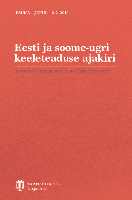
Eesti ja Soome-Ugri Keeleteaduse Ajakiri-Journal of Estonian and Finno-Ugric Linguistics
Unveiling New Horizons in Finno-Ugric LinguisticsEesti ja Soome-Ugri Keeleteaduse Ajakiri - Journal of Estonian and Finno-Ugric Linguistics is a premier academic journal published by UNIV TARTU PRESS, dedicated to advancing the field of linguistics with a particular focus on the Estonian and Finno-Ugric languages. Since its inception, the journal has embraced an Open Access publishing model, allowing researchers and enthusiasts to freely explore its groundbreaking studies and findings since 2013. With an Impact Factor that places it in the Q3 quartile of leading journals within the linguistic domain, it serves as a vital platform for the dissemination of new research and theoretical advancements. Ranked 410th out of 1088 journals in the Arts and Humanities category for Language and Linguistics, it reflects a robust commitment to quality scholarship that appeals to academics, professionals, and students alike. Operating from Tartu, Estonia, the journal aims to foster greater understanding and appreciation of the Estonian language within the broader context of Finno-Ugric studies, making it an essential resource for anyone interested in these unique linguistic cultures.
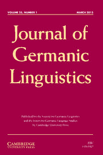
Journal of Germanic Linguistics
Advancing Understanding in Germanic LinguisticsThe Journal of Germanic Linguistics, published by Cambridge University Press, is a premier academic journal dedicated to advancing scholarship in the field of linguistics with a particular focus on Germanic languages. With an impressive impact factor and a well-established reputation, this journal attracts contributions from leading researchers and professionals who delve into the complexities of language, syntax, semantics, and phonology. The journal holds a prominent position in its category, recognized as Q2 in Linguistics and Language and Q1 in Literature and Literary Theory according to latest rankings. By fostering innovative research, the Journal of Germanic Linguistics plays a crucial role in shaping the discourse around Germanic linguistics, providing an essential platform for both emerging scholars and seasoned academics alike. Although it does not offer Open Access options, it continues to be a vital resource for the global academic community, with a convergence of works published throughout its history from 2001 to 2007 and again from 2009 to 2024, ensuring an enriching repository of research for future generations.
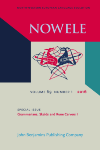
NOWELE-North-Western European Language Evolution
Exploring the Evolution of Language DynamicsNOWELE-North-Western European Language Evolution, published by John Benjamins Publishing Co, serves as a vital platform for researchers and scholars interested in the evolution and dynamics of North-Western European languages. With an ISSN of 0108-8416 and an E-ISSN of 2212-9715, this journal has been contributing to the field of linguistics since its inception in 1983, with ongoing publications until 2024. Indexed in Scopus and classified in the Q3 category for Linguistics and Language, NOWELE is recognized for its rigorous academic standards and diverse contributions, ranking #485 out of 1088 in the Arts and Humanities category, and #566 out of 1167 in Social Sciences. The journal fosters an open dialogue within the linguistic community, presenting innovative research findings and theoretical advancements. Researchers, professionals, and students alike benefit from its systematic exploration of language evolution in the context of a rapidly changing global linguistic landscape.